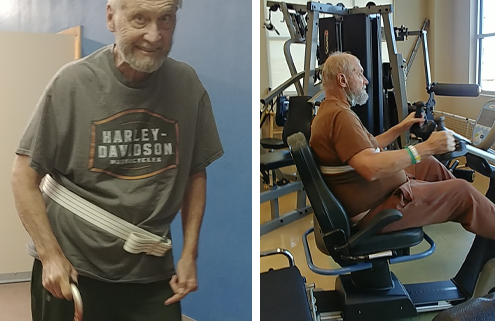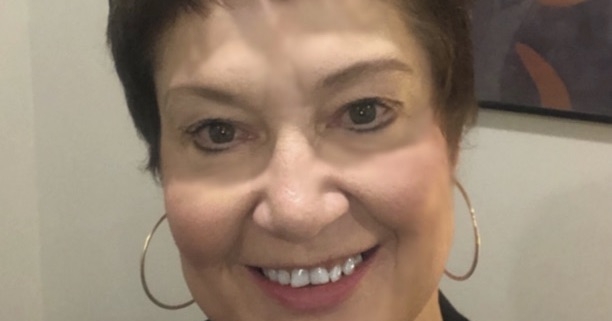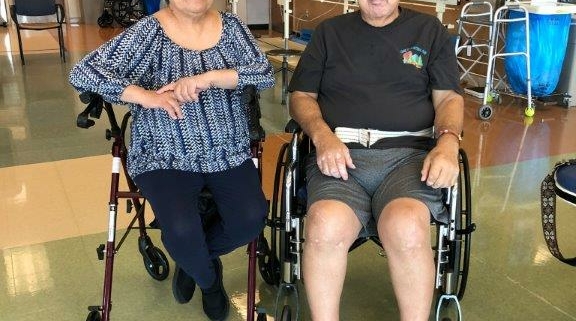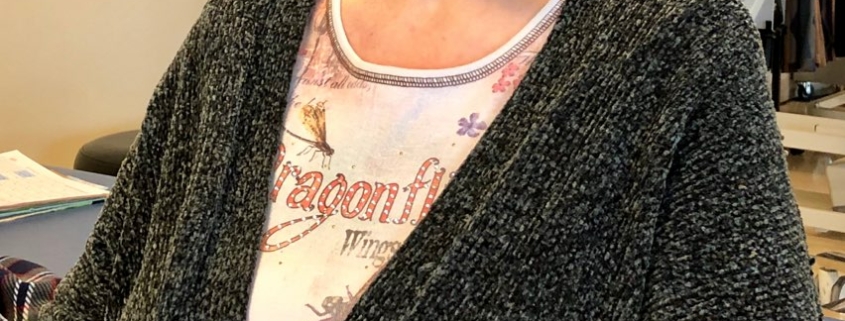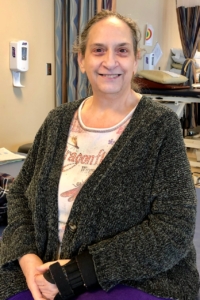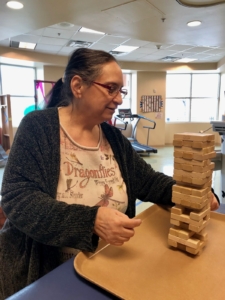After a day of chopping wood and running on the treadmill this past spring, John suddenly slumped to his left side and could not talk or swallow. Recognizing the symptoms of a stroke, Jeanne, a retired nurse, quickly called 911.
Ken Walsh and his wife, Helen, live in Powell, WY. They have two sons Kenny, 25, and Cole, 23. Ken is a lease operator in the oilfield. He has taken care of two facilities and over 70 wells which included gas collection for the pipeline to Billings, MT. Ken loves all things outdoors. The Walshes have horses and Ken is a hunter. He is fortunate to be able to take multiple weeks off for hunting, including backcountry guide pack trips.
One April day, Ken began having difficulty breathing. He had Helen take him to the local ER in Powell. He was life-flighted to Wyoming Medical Center (WMC) in Casper. At WMC, Ken was intubated, but eventually discharged home after two weeks. He continued to do great until July rolled around.
On July 18th, Ken suffered a stroke. In need of rehabilitation, Ken was provided the choice of several skilled nursing facilities in the Big Horn Basin area. Ken’s brother, an ER physician, recommended Elkhorn Valley Rehabilitation Hospital in Casper. A physical therapist friend also recommended EVRH. When Ken saw that EVRH ranked in the top 10% of rehabilitation facilities in the nation, he made his decision. After ten days at the Billings Clinic, Ken transferred to EVRH. He arrived with little to no use of his right side and completely dependent.
After two weeks, Ken began to experience issues breathing. Doctors at EVRH sent him to WMC to address the increased oxygen needs. Placed on a BiPAP and 15L of oxygen, Ken began to worry. “I thought that was the end,” he recalled. “I didn’t think I was going to make it.” But his respiratory status stabilized at WMC and he transferred back to EVRH.
“Knowing what I know now, I am really glad I came [to EVRH]!” Ken said. “Dr. Mohr and Dr. Swan have invested a lot of time seeing me and I was a challenge. I pushed myself but couldn’t breathe. After adjusting and adding medications, I can breathe better and I can push myself to strengthen my body because I have lost so much.”
‘The staff and therapy have helped so much, even though it took me pushing myself to the limits,” Ken continued. “They are the ones that got me better. They are my heroes. It has been tough with COVID and not seeing friends and family, but it is better to be here and make the best of it. Be open-minded. I have improved so much!’
‘The care the docs give…they care. The care I got is overwhelming and it’s amazing that a person can be treated that well. I wouldn’t trade my stay at EVRH for anything! The staff is incredible. No doubt. Even though EVRH is over 250 miles from home it is worth it!”
Success to Ken is not defined in what you can do, but how you get it done. “I might do things differently now, but I still get the same results. It might take me longer, but I still strive for success no matter how hard the task. I can eat with my hand now and I couldn’t before. I can walk now, and I couldn’t before. My goal is to go hunting again this year and get a deer and hopefully an elk.”
At 21-year-old, Jessica Caves had her whole life in front of her. That was particularly true when Jessica held her 9-month-old daughter, Olivia. But then one day, she couldn’t do that anymore when her extremities went numb and her face began to tingle. Jessica’s mother brought her to the ER at Wyoming Medical Center.
In the week that followed, Jessica underwent multiple tests. Physicians diagnosed her with Guillian-Barre syndrome. Jessica began treatments, including four MRIs and five days of IVIG treatment. Upon completion of the treatment protocol, Jessica transferred to Elkhorn Valley Rehabilitation Hospital.
For Jessica, the first week at EVRH, as well as her stay at Wyoming Medical Center, were hard to recall. She only recalls “faint memories” of these first two weeks. What she does remember, is a persistent struggle with why this happened. The symptoms appeared “out of the blue” and that bothered Jessica.
Over time, the “why” became less important as Jessica’s recovery progressed. Part of her healing involved regaining her ability to eat. When she arrived, Jessica’s facial numbness resulted in left side facial paralysis. Eating was extremely difficult. Jessica’s initial diet consisted mostly of yogurt.
Vibrant and motivated, Jessica is a beautiful person and spirit, all around. That served her rehabilitation well. Her hard work and will to recover, combined with the support of her loving family and the clinical excellence of the EVRH staff, led to incredible progress. After eight weeks, Jessica discharged home with her daughter and family.
Jessica applauded her “goofy, silly, and fun” therapists, Jessica T. and Katie B., who made it “a lot easier to connect” as a patient. She also credits her family for their support, especially her mother and daughter who visited frequently. Jessica looks forward to bonding, reading books, preparing bottles, and changing diapers — all the things a mother loves to do.
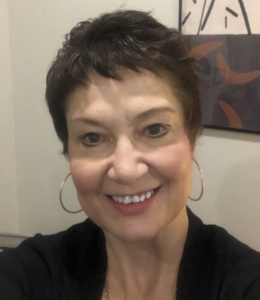
Tammy Wuertley suffered a traumatic brain injury when she was struck by a passing truck in a hit-and-run accident.
“On August 10, 2019, I was walking across the street in the very early, dark morning, when I was hit by a passing truck that had never stopped. I fell and landed on the hard pavement. Although I was hit on my right side, I fell on my left side, hitting the back of my head against the cement, causing my brain to scatter through my skull, swell and bleed. I lost consciousness and was emergently transported to the Wyoming Medical Center Emergency Department by ambulance. Interesting way to describe this, right?
After an examination by the hospital’s physician and undergoing a CT, I was diagnosed with a “left subdural hematoma with significant midline shift” and was immediately taken to the operating room. I underwent a decompressive craniotomy surgery by the neurosurgeon, Dr. Warren. Following the surgery, I was admitted to the intensive care unit at the hospital.
I do not remember any of this event. I have read my medical records and talked to my family, my friends, and those who visited me at the hospital. Evaluations and testing of my cognitive and neurological functions (taken by my medical providers), revealed neurological deficits and made it very clear that I suffered from a traumatic brain injury (TBI) as a result of this hit and run accident, and that I would need extensive speech, occupational and physical rehabilitation treatment to help these deficits. The fall injured my brain primarily in the front and temporal lobe areas. The frontal lobe controls the cognitive part of your brain, including common daily life functions, memory ability, attention span, problem solving, reasoning abilities, organization functions, and your personality. The temporal lobes control language comprehension, as well as our verbal memory and ability.
Following my discharge from the Wyoming Medical Center on August 21, I was transferred to Elkhorn Valley Rehabilitation Hospital in Casper, where I stayed and received two weeks of physical therapy, occupational therapy, and speech therapy. I was unable to walk much and spent the first week in a wheelchair. I had rib fractures and nerve damage in my left foot, a scarred head from my surgery and other bruises. I confused a lot of words and had a lot of difficulty carrying on a conversation, and with writing. I worked hard at my therapy, and after one week, my wheelchair was taken away from me. I was walking. I was not allowed to watch any television, use my cell phone or do anything else that would interfere with my attention span and other deficits. As a result, my attention span ability, language use, writing, and conversation skills dramatically improved.
After two weeks at Elkhorn, I was then transferred to Quality Living Inc., (QLI) located in Omaha, Nebraska. This is a well-known medical rehabilitation center that specializes in traumatic brain injury, spinal cord injury, and other neurologic injuries. Its primary goal is to get patients back to their normal lifestyle way of living. I spent six weeks there, 20 hours away from home, and lived in a house on QLI’s campus with six men and one other woman, all of us battling with our own injuries. We all became so close and like a family. Every day Monday through Friday, we all participated in our own treatments from 8:00 – 11:00 am, then ate lunch together, and then went back to our treatments from 1:00-4:00 p.m. We ate dinner together and attended things together. I spent several hours each day receiving speech therapy, vocational rehabilitation therapy, physical therapy, and daily living skills. On the weekends, we did activities such as yoga, shopping, visiting restaurants and event went to a rock climbing gym on a Saturday. I was given the opportunity to drive with an instructor, cook dinner for myself and housemates, as well as do my own laundry and chores — just to make sure I was still able to do that! I was released and returned home on October 26.
I am so glad and happy to be back home! On November 4, I returned to work as a paralegal, part-time, but plan on being back full-time at the end of January. My employer and co-workers at The Spence Law Firm, and my boss, Jason Neville, have been extremely kind and good to me throughout this entire ordeal, and I am so excited to return to them! Everyone from my former employer, Williams Porter Day & Neville, were also and still are, so supportive and helpful for me.
Although I went through extensive treatments for my TBI, I still have cognitive deficits that I am still working on. I still have sore ribs and symptoms from my foot injury. I use a lot of tools to help my brain, such as taking things step-by-step, relying on visual aids and recording devices to help me remember things, and keeping complete calendars full with every appointment, event, and schedule that I participate in every day. I ask for written and oral instructions whenever possible. I create checklists, take a lot of notes, and write myself reminders. I also keep calendars to track long-term assignments, due dates, chores, and daily activities. The calendar is also kept on my phone and sends me reminders so I remember what I am doing! The best thing is that the majority of my brain injury symptoms will make great recovery within a year.
This entire event has changed my life. I am grateful to have made it this far in what is normally considered a short time when you think of the injuries I received. I am thankful for life. I tend to look more at the optimistic things and ignore things that are not so great. I work hard. I take it easy when I need too. I still research and study a lot about the effects a TBI can cause. I am more careful. I eat much better, I exercise daily, I play board games. I participate in events and activities that increase my brain’s thoughts and abilities. I keep in touch with my former housemates at QLI. I adore, love and appreciate all of my family and friends. I received so much support from everyone while I was going through my medical treatment, and still do! And to all of the LAW members – thank you so much for the wonderful gifts and for thinking and praying for me! I truly believe that all of the support I received from everyone truly helped me make it through this and I am forever appreciative and thankful!”
A letter recently received from Jim Hinton, a former patient:
Elkhorn Valley Rehabilitation Hospital,
Tuesday, June 18th, marks 6 months since my “simultaneous bilateral knee replacement” surgery. I wanted to take this time to thank everyone at Elkhorn for the excellent care I received after my surgery. After all the research I did before surgery, I thought I could do my rehab at home on my own. Boy was I wrong! I am so glad the staff at Avista Adventist Hospital in Louisville, CO convinced me to spend a week at Elkhorn. During that week, I was setup for success getting my rehabilitation started, and in continuing my rehabilitation to this day.
There were lots of places I imagined spending Christmas week and Christmas day, but a rehab hospital never occurred to me. Still, I was well cared for during that week, and I wasn’t discharged until you all were sure I was ready.
My knees still hurt a little, but the important thing is the knee joint pain is completely gone. Most of the pain now is from scar tissue, but I still work on that, exercising and massaging. Six months from now, I hope almost all the pain will be gone. We’ll see. Still, after everything, I’d do it all again. It wasn’t near as bad as I had imagined while researching the surgery.
I’m still not ready to hike to the top of Laramie Peak yet..maybe next summer. For now, it’s nice to be able to go to the grocery store, and not be in agony by the time I get back to my car.
Again, thank you to all your staff at Elkhorn Valley.
James “Jim” Earle Hinton
Casper, Wyoming
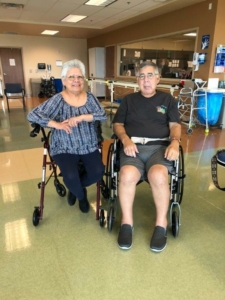
Rudy Garza (pictured with his wife, Gloria) suffered a stroke while visiting Casper, WY from his home in Philadelphia, PA.
Rudy Garza and his wife, Gloria, were visiting Casper, WY when he suffered a stroke. Treated at Wyoming Medical Center, Rudy and Gloria were determined to get back to their home in Philadelphia, PA. Unfortunately, Rudy’s condition simply didn’t allow an immediate return home on a plane. After four days, Rudy transferred to Elkhorn Valley Rehabilitation Hospital for inpatient rehabilitation.
“When we arrived [at EVRH] we were very scared,” said Gloria. “We aren’t from here, and we were dealing with a medical condition that we were unfamiliar with. My husband is not a trusting person, and it takes time for him to build trust with people professionally. My husband never feels safe, but he felt safe here.”
Rudy echoed his wife’s reflection on their arrival. “I’ve been in countless hospitals, both military and civilian,” he said. “Usually, it takes time to build trust with the staff, but not here. I have felt cared for since day one.”
The staff at EVRH shared the Garza’s determination to help them return to the City of Brotherly Love. They got to work immediately on getting Rudy healthy enough to fly home.
“From the day we arrived, I felt like he was taken care of medically, psychologically, and emotionally,” Gloria noted. “The entire staff was focused on his success. Everyone from the administration, food service, housekeeping, therapy, and nursing was dedicated to his healing.”
With everyone working as a team, Rudy was able to heal quickly. Gloria recognized the impact this interdisciplinary approach had on Rudy’s recovery. “Food service did an amazing job and they cared about his healing and well-being,” she stated. “The nurses cared for my husband, but would also ask me if there was anything I needed. The pharmacy staff has worked tirelessly to make sure all of our medications are organized for when we go home. Respiratory helped us get set up with a CPAP. Therapy worked as a team and did a remarkable job in helping him recover.”
“We’ve been to hospitals all over the world and not one has been as dedicated to holistic care as Elkhorn is,” Gloria added.
Rudy added, “Everyone who interacted with me was kind and caring. I was able to go to therapy with an open heart.”
After 23 days, Rudy made enough progress to return home to Philadelphia. “I’ve gotten what I came for, and so much more,” Rudy said. “I feel confident going forward, and I know that I’m only going to get better from here.”
“This place has been a Godsend,” Gloria added, “and we are thankful He parked us here.”
The Garzas made a lasting impact on the staff at EVRH, as well. “I’ve personally never heard kinder words about this hospital and the staff,” said Gabriella Aragon, one of Rudy’s physical therapists. “I’m incredibly proud to work here, and I feel very privileged to have gotten to know [the Garzas].”
Ellen DeFrank, 57, moved from Arkansas to Casper, WY to be closer to her family. Six months later, Ellen suffered a stroke while visiting her brother and sister-in-law. While sitting on their couch, Ellen suddenly couldn’t lift her head. Her speech had become slowed and slurred. Ellen recalls her face did not droop, which often accompanies the slurred speech. But she and her family knew something wasn’t right and called 9-1-1.
Ellen was taken by ambulance to Wyoming Medical Center where the Primary Stroke Team delivers the best and fastest stroke treatment possible. Imaging of Ellen’s brain showed multiple strokes affecting her left side. In fact, many “old” and “new” strokes were found. This could explain Ellen’s nagging headaches and dizziness over the last few years.
After three days at Wyoming Medical Center, Ellen transferred to Elkhorn Valley Rehabilitation Hospital. This began her 16-day journey in acute inpatient rehab. Ellen’s rehab focused on her global left-sided weakness and word-finding difficulty.
Like many stroke survivors, Ellen experienced post-stroke depression. Ellen was reluctant to leave her room and enter the world of rehab. “Afraid that no one would understand her speech,” Ellen struggled with the desire to go home and with her family’s desire for her stay and recover. In Ellen’s own mind, she “didn’t make sense and sounded different.” In fact, she would often feel her mouth to make sure it was moving. On Ellen’s 3rd day at EVRH, she went to the cafeteria, where another patient assured her she was understood. Coupled with the reassurance of her EVRH clinical team, this paved the way for Ellen’s emotional and physical recovery.
During her stay at Elkhorn Valley, Ellen received physical, occupational and speech therapy. Always humble throughout her stay, Ellen credits speech therapy “for giving her a voice,” and physical therapy for “teaching her to walk.” Although Ellen is a petite 4’11”, she “felt like 6’0 when walking around Elkhorn Valley.” She would simply say “morning” to everyone she would encounter, as “good” was hard to say. Her philosophy is that a smile and a “morning” makes a potential bad day good.
Ellen is very proud to have achieved all her therapy goals while at Elkhorn Valley. During her stay, Ellen’s philosophy was (and still is), “always follow through and don’t stop!”
Ellen also enjoyed an early birthday celebration during her stay. She was thrilled to escort her family to EVRH’s South Day Room for this special occasion. She reports “no limping, walking normal and straight,” – definitely reason to celebrate.
While she still wants to “talk better without pause and delay,” Ellen is doing exceptionally well upon discharge and attends EVRH outpatient therapy.
Ellen is happy to be home with her family – enjoying their conversations, watching movies and walks in the neighborhood. She would also like to remind all that “not every stroke is the same.” Please do as Ellen and her family did and call 9-1-1 at the first signs of a stroke.
About Ernest Health
Elkhorn Valley Rehabilitation Hospital is part of Ernest Health, a network of rehabilitation and long-term acute care hospitals. Ernest Health hospitals see patients who are often recovering from disabilities caused by injuries or illnesses, or from chronic or complex medical conditions.Read More
Quick Reference Links
• Contact Us• Career Opportunities at this Hospital
• Price Transparency
• About Ernest Health

5715 East 2nd Street, Casper, Wyoming 82609
P 307.265.0005 F 307.268.7770 E Email
Follow Us: Facebook | YouTube

